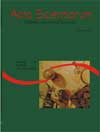<b><em>Bartolomé de Las Casas</em>’ political legal thought of the new world native</b> - DOI: 10.4025/actascihumansoc.v25i1.2213
Abstract
The cultural chock between the old and the new world, when America was 'discovered' by Spain, caused a lot of important political, philosophical and legal discussion among jurists, theologists and other intellectual people. Bartolomé de Las Casas, who came to America in 1502 as an encomendero (person who takes or executes orders) and, afterwards, became a Dominican Father, was one of these individuals who discussed themes such as the natural right and people’s rights, the 'infidels' evangelization, the native slavery, the encomiendas (order for goods) system, as well as the kings and the Pope own legitimization power over the infidels. Analyzing Las Casas’ political legal thought of the inhabitants from that world, exposed to the Christian Europe, based on his work entitled Tratados of 1552, we can state that, in opposition to the official historiography of that period, Bartolomé de Las Casas showed a different image of the native in his papers, defending their governmental and freedom rights, among othersDownloads
Download data is not yet available.
Published
2008-04-15
How to Cite
Bernardo, D. G., & Mainka, P. J. (2008). <b><em>Bartolomé de Las Casas</em>’ political legal thought of the new world native</b> - DOI: 10.4025/actascihumansoc.v25i1.2213. Acta Scientiarum. Human and Social Sciences, 25(1), 149-157. https://doi.org/10.4025/actascihumansoc.v25i1.2213
Issue
Section
Social Sciences
DECLARATION OF ORIGINALITY AND COPYRIGHTS
I Declare that current article is original and has not been submitted for publication, in part or in whole, to any other national or international journal.
The copyrights belong exclusively to the authors. Published content is licensed under Creative Commons Attribution 4.0 (CC BY 4.0) guidelines, which allows sharing (copy and distribution of the material in any medium or format) and adaptation (remix, transform, and build upon the material) for any purpose, even commercially, under the terms of attribution.
Read this link for further information on how to use CC BY 4.0 properly.























